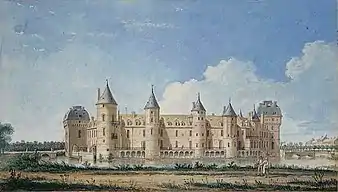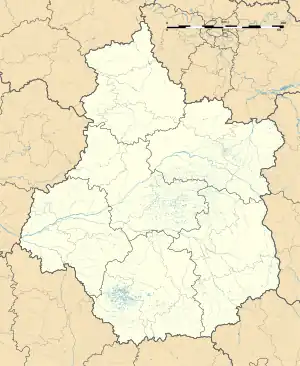La Ferté-Vidame
La Ferté-Vidame (French pronunciation: [la fɛʁte vidam]) is a commune in the Eure-et-Loir department in northern France.
La Ferté-Vidame | |
|---|---|
 View of Ferté-Vidame castle, before 1750, Louis-Nicolas van Blarenberghe | |
 Coat of arms | |
Location of La Ferté-Vidame | |
 La Ferté-Vidame  La Ferté-Vidame | |
| Coordinates: 48°36′30″N 00°53′59″E | |
| Country | France |
| Region | Centre-Val de Loire |
| Department | Eure-et-Loir |
| Arrondissement | Dreux |
| Canton | Saint-Lubin-des-Joncherets |
| Government | |
| • Mayor (2020–2026) | Catherine Stroh[1] |
| Area 1 | 39.81 km2 (15.37 sq mi) |
| Population | 581 |
| • Density | 15/km2 (38/sq mi) |
| Time zone | UTC+01:00 (CET) |
| • Summer (DST) | UTC+02:00 (CEST) |
| INSEE/Postal code | 28149 /28340 |
| Elevation | 214–286 m (702–938 ft) (avg. 246 m or 807 ft) |
| 1 French Land Register data, which excludes lakes, ponds, glaciers > 1 km2 (0.386 sq mi or 247 acres) and river estuaries. | |
History
The title of vidame of Chartres was, under the Ancien Régime, attached to the lands of [La] Ferté-Arnault. Among the famous men to bear the title Vidame de Chartres were François de Vendôme, Vidame de Chartres, the English soldier Thomas de Scales, 7th Baron Scales (d. 1460), Jean de Ferrieres, and the memoirist Louis de Rouvroy, duc de Saint-Simon. The château was Saint-Simon's main country house. Until shortly before the French Revolution the seigneur was Jean-Joseph de Laborde, an ennobled business man with progressive views, who was to be guillotined in 1794.
In July 2019 a collector’s gathering was held at La Ferté for Citroën to mark the company's 100th anniversary. The event spread over one weekend and showed over 8,000 cars with nearly 100,000 people in attendance.
Castle

The Château de la Ferté-Vidame was substantially rebuilt by the architect Antoine Matthieu Le Carpentier in 1771. It is now a roofless shell.
At the Bourbon Restoration, it was restituted to the duchess of Orléans, as the closest relative of her father Louis Jean Marie de Bourbon, Duke of Penthièvre, the owner before the French Revolution. On her death in 1821, the domaine passed to her eldest son Louis-Philippe I, future king of the French. He reconstituted the domaine, rebuilt its fortified wall, repaired its water features and restored and expanded the small château, though the restoration was interrupted by the Revolution of 1848.
Population
| Year | Pop. | ±% |
|---|---|---|
| 1962 | 693 | — |
| 1968 | 793 | +14.4% |
| 1975 | 790 | −0.4% |
| 1982 | 784 | −0.8% |
| 1990 | 801 | +2.2% |
| 1999 | 818 | +2.1% |
| 2008 | 766 | −6.4% |
See also
References
- "Répertoire national des élus: les maires". data.gouv.fr, Plateforme ouverte des données publiques françaises (in French). 2 December 2020.
- "Populations légales 2020". The National Institute of Statistics and Economic Studies. 29 December 2022.
